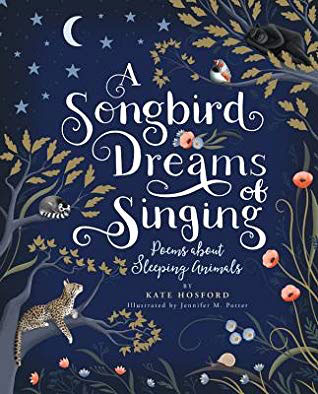
Did you know: Otters sleep while holding hands, zebra finches rehearse their songs while dreaming, worker ants take more that 250 naps per day, and frigate birds sleep while flying?
A Songbird Dreams of Singing; Poems about Sleeping Animals is a stunning book of poems about wildlife, paired with explanations about the fascinating science behind animal sleep habits.
“Not only is [A Songbird Dreams of Singing] gorgeous and the poems so original and beguiling; the informational text is a total wow!”
Author of the National Book Award finalist, The Soul of an Octopus: A Surprising Exploration into the Wonder of Consciousness
Writing Songbird
My mother is always reading —fiction, non-fiction, you name it. In 2016, she could not stop talking about The Soul of an Octopus, by Sy Montgomery. In fact, she talked about it so much, that it became a family joke. (Please Mom —stop talking about The Soul of an Octopus!) I finally decided to find out what all the fuss was about. By page two I was hooked; The Soul of an Octopus was an incredible exploration into the intellectual, emotional and physical world of this fascinating creature.
After completing the book, I decided I would try to write a poetry collection about the octopus, although I had never written a non-fiction book before. I reached out to Sy Montgomery, and asked her if I could visit her contacts at the Boston Aquarium. Sy graciously invited me to go to the Boston Aquarium with her and meet her namesake, Sy the Octopus. When Sy the Octopus explored my arm with her eight arms and looked me in the eye, I had no doubt that I was interacting with a highly intelligent being.
Despite my enthusiasm, when I sat down to write the octopus poems, I had trouble finding my own voice. I was not doing justice to this incredible animal, and my poems were either overly serious or trite. I stopped writing octopus poems, but my explorations had led me to another topic. After learning that octopuses have REM cycles and change colors when they dream, I started to wonder about the sleep habits of other animals. After a bit of research, I learned that ducks sleep with one half of their brains at a time, otters hold hands while sleeping, sloths sleep upside down…and that was only the beginning.
I began to write poems about sleeping animals while reaching out to many different scientists. Amazingly, almost everyone wrote back quickly with helpful information. Sofija Canavan, an MD-PhD student at the Daniel Margoliash laboratory at the University of Chicago answered countless questions about her research into the male zebra finch’s ability to rehearse his song while dreaming. Eventually, she became an advisor on the book, helping me understand many aspects of animal sleep. It turned out that animal sleep was not only a fascinating topic to research, but also an area where some of the discoveries were quite recent. For instance in 2016, Dr. Niels Rattenborg at the Max Planck Institute for Ornithology, discovered that frigate birds can fall fully asleep for a few seconds while flying! A whole new world opened up to me; I was spending my time looking at diagrams of antennae positions for sleeping ants, talking to Duke Lemur Center about ancient lemur migration, and consulting experts in Namibia about the length of a giraffe’s nap.
One of my most exciting contacts was with Jon Ablett, Senior Curator in Charge of Mollusca at the Natural History Museum in London. Jon clarified the biographical details for the museum’s most famous napping snail. In 1846, this snail was accidentally glued down to a display while still alive. Left with no choice, he took a four-year nap, before someone noticed a bit of slime where he’d tried to escape. At that point, they dunked him in water, and he woke up, no worse for wear.
On a recent trip to London, Jon gave me the behind-the-scenes tour of the museum’s mollusk collection. Not only did I see the famous snail’s shell, I also saw an octopus that Darwin had collected, a giant squid from the Falkland Islands, and the world’s largest mollusk library where a copy of this book now resides.
Will I ever write that book of octopus poems? I hope so, but now there are so many animal- themed poetry collections that I want to attempt. Also my mother has started sending me articles about animals who use tools, so who knows where that might lead…
Honors and Awards
Nominated for North Somerset Teachers’ Book Award 2020
Hike.co.uk Book of the Month November 2019
Reviews
Publishers Weekly
Kirkus Review
Interviews and Blog Posts
Nerdy Book Club
Cynsations
Wild Things